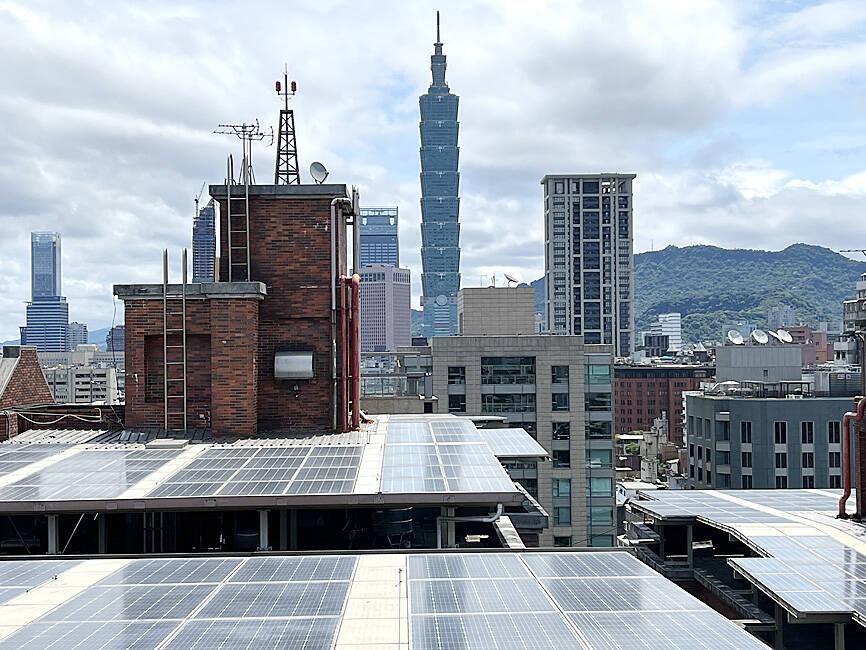The Ministry of the Interior recently released a new draft of its rooftop solar panel mandate, exempting religious buildings and other structures from a requirement to install panels on all new structures and renovations more than 1,000m².
The draft exempts four types of buildings: religious and funeral buildings, those that house hazardous materials, buildings that receive insufficient sunlight and other cases with “special circumstances.”
The Legislative Yuan in 2023 passed amendments to the Renewable Energy Development Act (再生能源發展條例), stipulating that all new construction, reconstruction or expansions that meet certain conditions would be required to install rooftop solar panels.

Photo: Chen Chia-yi, Taipei Times
It required the Ministry of Economic Affairs and Ministry of the Interior to stipulate specific criteria.
The new draft says that all new buildings or renovations with an area of 1,000m² or larger must install a 1 kilowatt per 20m² solar panel system.
Panels may be installed on the rooftop, awnings or on the ground to meet the requirement.
While previous drafts stipulated the “rooftop area,” the new draft instead stipulates “building area,” an official from the National Land Management Agency said.
This means that the area requirement would effectively be based on the area of the first floor, which is typically larger than the rooftop, the official said.
There are four types of building exempt from this requirement.
First, religious and funeral buildings which have specific cultural and architectural value are exempt.
Second, buildings that deal with the manufacturing, packaging, sale or storage of hazardous materials are exempt, as installing solar panels could cause public safety concerns.
Third, if buildings cannot install solar panels due to special circumstances, they may be exempt if they provide sufficient supporting documents.
Fourth, buildings that do not receive sufficient sunlight to meet the power generation standard may be exempt if they provide a valid power generation assessment.
The annual power generation standard is 543 kilowatt hours (kWh) for Keelung, Taipei, New Taipei City, Taoyuan, Hsinchu County, Hsinchu City, Miaoli County, Yilan County and Hualien County, 579 kWh for Taitung County and 625 kWh for all other municipalities and counties.
These standards are based on sunlight conditions in different regions and the effectiveness of solar panels, the official said.
If solar panels are not accordingly installed, construction and occupancy permits would not be issued, they added.
The Ministry of the Interior would complete a final revision of the mandate based on feedback received over the next 60 days.
The Executive Yuan would then decide the implementation date.

WANG RELEASED: A police investigation showed that an organized crime group allegedly taught their clients how to pretend to be sick during medical exams Actor Darren Wang (王大陸) and 11 others were released on bail yesterday, after being questioned for allegedly dodging compulsory military service or forging documents to help others avoid serving. Wang, 33, was catapulted into stardom for his role in the coming-of-age film Our Times (我的少女時代). Lately, he has been focusing on developing his entertainment career in China. The New Taipei District Prosecutors’ Office last month began investigating an organized crime group that is allegedly helping men dodge compulsory military service using falsified documents. Police in New Taipei City Yonghe Precinct at the end of last month arrested the main suspect,

A cat named Mikan (蜜柑) has brought in revenue of more than NT$10 million (US$305,390) for the Kaohsiung MRT last year. Mikan, born on April 4, 2020, was a stray cat before being adopted by personnel of Kaohsiung MRT’s Ciaotou Sugar Refinery Station. Mikan was named after a Japanese term for mandarin orange due to his color and because he looks like an orange when curled up. He was named “station master” of Ciaotou Sugar Refinery Station in September 2020, and has since become famous. With Kaohsiung MRT’s branding, along with the release of a set of cultural and creative products, station master Mikan

LITTORAL REGIMENTS: The US Marine Corps is transitioning to an ‘island hopping’ strategy to counterattack Beijing’s area denial strategy The US Marine Corps (USMC) has introduced new anti-drone systems to bolster air defense in the Pacific island chain amid growing Chinese military influence in the region, The Telegraph reported on Sunday. The new Marine Air Defense Integrated System (MADIS) Mk 1 is being developed to counter “the growing menace of unmanned aerial systems,” it cited the Marine Corps as saying. China has constructed a powerful defense mechanism in the Pacific Ocean west of the first island chain by deploying weapons such as rockets, submarines and anti-ship missiles — which is part of its anti-access/area denial (A2/AD) strategy against adversaries — the

RISING TOURISM: A survey showed that tourist visits increased by 35 percent last year, while newly created attractions contributed almost half of the growth Changhua County’s Lukang Old Street (鹿港老街) and its surrounding historical area clinched first place among Taiwan’s most successful tourist attractions last year, while no location in eastern Taiwan achieved a spot in the top 20 list, the Tourism Administration said. The listing was created by the Tourism Administration’s Forward-looking Tourism Policy Research office. Last year, the Lukang Old Street and its surrounding area had 17.3 million visitors, more than the 16 million visitors for the Wenhua Road Night Market (文化路夜市) in Chiayi City and 14.5 million visitors at Tainan’s Anping (安平) historical area, it said. The Taipei 101 skyscraper and its environs —